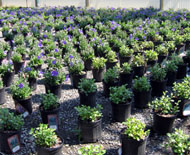Lynne Richmond
(609)292-8896
lynne.richmond@ag.state.nj.us
(TRENTON) – New Jersey Secretary of Agriculture Charles M. Kuperus today announced an expansion of the state’s agricultural recycling programs to include -- for the first time -- nursery pots, plastic flats, trays and cell packs.
“The Department of Agriculture has a strong commitment to ensuring compliance with New Jersey’s mandatory recycling regulations and we have been seeking environmentally-safe ways where farmers can safely dispose of the plastic waste they generate,” said Secretary Kuperus. “Farmers benefit by being able to sell their used agricultural plastics and the environment benefits by decreasing the waste stream into the state’s landfills.”
The cost of disposing of HDPE nursery pots weighing 20,000 pounds can be up to $580 at a landfill. It is expected that a grower who recycles those 20,000 pounds of HDPE nursery pots can earn as much as $400.
To date, Cindarn Recycling is the only plastics recycler that has contacted the Department of Agriculture and offered to work directly with farmers to recycle their nursery pots, plastic flats, trays and cell packs. According to Cindarn, they will pick up loads of half trailer or more, or for shipments of only a few pallets, they will combine the pickup with another nursery in the area. As new plastics recyclers are identified they will be included in the Department of Agriculture's web site.
For more details and updated listings, visit www.nj.gov/agriculture/divisions/md/prog/recycling.html.
Certain steps must be taken to prepare the materials for recycling. Each type of plastic must be segregated on separate pallets. Most of the plastic has a code stamped on it (#6 denotes polystyrene, #5 denotes polypropylene and #2 for HDPE). All plastics, with the same code, regardless of size, style or color, can be placed on the same pallet. Plastics can be mixed on the truck as long as each pallet only holds one type of plastic. In cases where the type of plastic can’t be identified, miscellaneous items can be placed on a separate pallet with a notation that the plastic needs to be sorted. Farmers are encouraged to keep the same type of plastic code on a single pallet so they receive the highest price. When the plastics are commingled on a pallet, a lower price will be offered for that pallet.
All loose dirt should be knocked out of the tray or pot. Minimum amounts of dirt, clinging to the sides or bottom, are acceptable. Trays with a quarter inch or more of dirt, especially if the dirt is hardened, should be cleaned more thoroughly. It is important to keep the scrap as dry as possible, since any residual dirt can easily be removed during the grinding process.
The trays should be nested together as tightly as possible. The stack should be placed on its side on the pallet to a maximum height of 7 feet. The pallet should then be stretch-wrapped. These steps should create a pallet that weighs about 800 pounds.
This recycling opportunity is just one of several economic development programs the Department facilitates to assist Garden State farmers in recycling the plastic generated on their farm operations and reduce their solid waste disposal fees. The other programs developed and implemented by the Department include the nursery and greenhouse film recycling program, the plastic pesticide container-recycling program and the agricultural plastics (mulch film, drip irrigation tape, silage and peat moss bags) recycling program.
To learn more about the plastic nursery pot-recycling program and obtain a list of the plastics recyclers offering nursery pot recycling, contact the recycling coordinator at (609) 292-5536.



